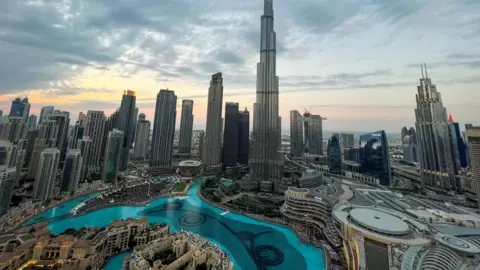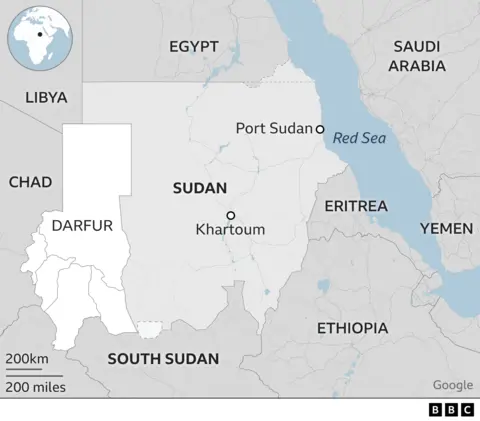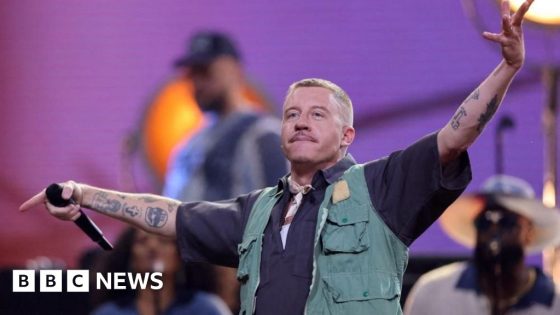 Reuters
ReutersWhen fans saw rapper Macklemore had cancelled an upcoming gig, some of them assumed it was in solidarity with Gaza.
But it wasn’t. The gig was in Dubai and he had cancelled over the war in Sudan, which has already killed tens of thousands of people, left millions more hungry and triggered a humanitarian disaster.
The glamorous Gulf city of Dubai is the biggest in the United Arab Emirates (UAE) – which has been widely accused of funding the Rapid Support Forces (RSF), one of the warring sides in Sudan.
“The crisis in Sudan is catastrophic,” Macklemore said in an Instagram post on Monday. Some food security specialists estimate up to 2.5 million people could die of starvation and illness by October.
“I have to ask myself what is my intention as an artist?” continued the rapper, who rose to fame with 2012 classic Thrift Shop.
“If I take the money,” Macklemore said, “while knowing it doesn’t sit right with my spirit, how am I any different from the politicians I’ve been actively protesting against?”
His moral stand has thrust the brutal conflict – which has garnered far less global attention than Ukraine or Gaza – into popular culture, and activists hope other artists will follow suit.
“It was huge,” says an activist in London who has been campaigning for a ceasefire. “In the comments there were a lot of people saying, ‘oh, my God, what’s happening in Sudan?’
“I think it opened people’s eyes.”
 Getty Images
Getty ImagesThe RSF is battling the Sudanese army for control of the country and has been accused of sexual violence, looting and ethnic cleansing in areas it controls.
A Human Rights Watch report suggests the RSF may have committed genocide against non-Arabs in a city where 15,000 people are feared to have been killed, something the group denies.
The RSF traces its roots to a militia, known as the Janjaweed, which were also accused of genocide 20 years ago in Sudan – an estimated 300,000 people died back then.
Evidence tying the UAE to the RSF has been mounting.
During the war it emerged that the RSF had used drones which a weapons expert from Amnesty International described as the “same drones” the UAE had supplied to its allies in other conflicts, including in Ethiopia and Yemen.
Experts have also seen civilian aircraft allegedly transporting weapons from the UAE to the RSF, according to a UN report presented to the Security Council earlier this year.
The allegation is that the UAE is trying to gain an economic foothold in the Red Sea and profit from Sudan’s resources.
The RSF controls some of Sudan’s most lucrative gold mines, located in the Darfur region.

A Swiss aid organisation alleges the Emiratis are importing billions of dollars worth of the precious metal that are smuggled out of Africa, including Sudan.
And before widespread fighting broke out in the country last year, the UAE signed a deal worth $6 billion to build and operate a port, airport and economic zone on the country’s Red Sea coast.
The UAE government has described the allegations over its involvement in the Sudan conflict as “baseless and unfounded”, and meant “to divert attention from the ongoing fighting and humanitarian catastrophe”.
“UAE reiterates its call for an immediate ceasefire in the ongoing conflict. The warring parties must stop fighting and work towards finding a peaceful solution to the conflict through dialogue,” it said in a statement to the UN.
Macklemore said on Instagram that several groups had been reaching out to him over the Sudan crisis for months.
A representative of Madaniya, an organisation for Sudanese people living in the UK, told BBC News: “A boycott by a major artist is obviously going to bring more attention to the Sudanese cause, which is great.
“What would be a wonderful secondary consequence is if more people were to look into the UAE’s involvement in Sudan.”
Over the next few weeks, Calvin Harris is due to give a performance in Dubai’s harbour and Sophie Ellis-Bextor has a date at the opera house.
Neither replied to a request for comment.
Would a boycott change anything?
Prof Alex de Waal, an expert on Sudan based at Tufts University in Massachusetts, thinks a cultural and sporting boycott could be an effective way of targeting the regional powers accused of fuelling the war.
He says the UAE and Saudi Arabia are competing for influence in Africa and are backing opposing sides in Sudan. The Emirati and Saudi embassies in London have not responded to a BBC request for comment.
Prof de Waal is convinced that the Arab rivals are so economically powerful that no-one is likely to sanction them – and says that any such measures would be difficult to implement.
It wouldn’t be a priority for many Western countries, he adds, which are pre-occupied with the Israel-Gaza war and tensions with Iran.
But he also suggests the UAE and Saudi Arabia care greatly about their reputation on the international stage.
“Cultural figures and sports figures saying ‘we’re not going there’ counts for much, much more than a threat of trade sanctions or financial penalties.
“I think, interestingly, the [threat to them] of soft power is much stronger, and has much greater potential, than hard power.”
Dr Crystal Murphy, a specialist on East African finance based at Chapman University in California, points towards protests against apartheid in South Africa which ultimately “rewrote political science and international relations”.
She explains: “The boycotts came as a result of tonnes of public and celebrity [organising] and raising awareness of the issue, where enough people were pushing their governments.
“So it can happen,” she adds. “What’s the difference between Macklemore and the South Africa boycotts?”
Campaigners are a long way from achieving boycotts of that scale, but are hopeful that momentum will gather after Macklemore’s move.
The representative of Madaniya describes warring generals as trying to destroy the fabric of Sudanese society. But that doesn’t deter activists. “There’s always a hope for the Sudanese people.”
Already, some people may be following in Macklemore’s footsteps.
One commenter on his post said they’d been invited to speak at a convention in the UAE, but now said: “Your post encouraged me to research a bit more and I decided to decline the offer.”

Source Agencies



